They have become lawyers, activists, university professors, writers and film directors — all feminists with the same powerful mission to improve the status of women.
For 35 years, the City of Toronto Women and Gender Studies Scholarship — originally called the City of Toronto’s Scholarships in Women’s Studies — has been empowering Faculty of Arts & Science students.
“This scholarship has been a really important way of recognizing the outstanding work our students are doing and its impact on the worlds outside the classroom and university,” says Alissa Trotz, director of the Faculty of Arts & Science’s Women & Gender Studies Institute at the University of Toronto and a professor in the undergraduate Caribbean Studies Program at New College.
The scholarships provide much-needed support to “our fierce students whose work tackles critical questions in far-reaching and imaginative ways,” says Trotz.
The scholarship was created in 1985 to fill a void in available scholarships for women. Then-U of T Professor Kay Armatage; Ceta Ramkhalawansingh, staff in Toronto City Hall’s Equal Opportunity Office and a former instructor in U of T’s first women’s studies course; June Rowlands, the city’s budget chief during her time on council; and Anne Johnston, chair of the city’s board of health, worked together to create the scholarship in the city’s name to commemorate the centenary of women being admitted as students to the University.
In 1997, concerns arose over losing the funds due to the municipal amalgamation. Ramkhalawansingh guided the transfer of funds to the University, which matched the donation. With these additional funds, a scholarship was established at the graduate level. To date, 34 scholarships have been awarded to undergraduates and 20 have been made to graduate students.
To celebrate this milestone, we share the inspiring stories of some of those recipients here:
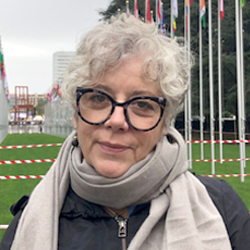
As a student in the Faculty of Arts & Science at the University of Toronto, Amanda Dale took the honour of being named “most likely to contribute to improving the status of women” to heart — and has kept it there for more than 30 years.
At the time, she was struggling to pay her rent, despite working three jobs. Education wasn’t her only focus, and she was at risk of dropping out of school altogether. Receiving the City of Toronto Women and Gender Studies Scholarship changed her trajectory completely.
“That award allowed me to take my academic life more seriously and to focus on it centrally,” Dale recalls. “My entire career since has been a contribution to the goal of the scholarship: to improve the status of women. I have taken that mission quite seriously.”
When she received the scholarship in 1988, women and gender issues weren’t yet widely accepted as a “legitimate” area of study. The male domination of academia was largely unchallenged. The scholarship — combined with her studies in the Faculty of Arts & Science’s Women & Gender Studies Institute more broadly — helped launch a career as a valued resource and recognized voice on gender equality.
“Having a women’s studies department that allowed me to focus on the kinds of academic questions that I was interested in, which related to social justice and the movement outside of the university, was all new in itself,” says Dale. “Then to have a scholarship specifically in my area of interest that also recognized that was quite extraordinary.”
As a member of Woodsworth College, Dale earned her honours bachelor of arts degree in political science and women’s studies from U of T in 1988. She credits the City of Toronto scholarship for leading to a Commonwealth Scholarship, which enabled her to pursue her master’s degree in social and political thought from the University of Sussex, UK, in 1991. She earned her master’s degree in International Human Rights Law from the University of Oxford, UK, in 2011, and a PhD in Law from Osgoode Hall Law School at York University in 2018.
The City of Toronto scholarship’s mission stayed with her as her career developed, including most recently as executive director with the Canadian Feminist Alliance for International Action, an alliance of organizations committed to advancing women’s international human rights in Canada, and previously as executive director of the Barbra Schlifer Commemorative Clinic, which offers legal, counselling and interpretation services to marginalized populations of women who have survived violence.
“The scholarship gave me grounding that has allowed me to think clearly and strategically with a deep-rooted feminist understanding of real-life situations throughout my career,” she says. “It changed everything, all my opportunities going forward. I say that without hyperbole. I have contributed to the world as a result of it.”
She’s particularly proud of her work with the Barbra Schlifer Clinic, taking it through its largest expansion and positioning it for stability and sustainability into the future. The expansion doubled the clinic’s staffing, more than doubled its funding, and diversified its revenue sources to enable survival through changes in government priorities.
“Given that we are only touching the tip of the gender-based violence ‘iceberg’ in my lifetime, I wanted to be a responsible custodian of this amazing community-built treasure and leave it for next-gen feminists and specifically, feminists of colour working from an intersectional lens, to shape for their needs,” Dale says. "I feel I have achieved that goal.”
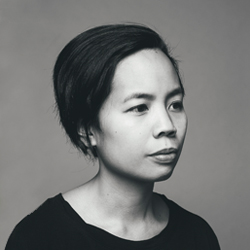
While delivering a university lecture on performance, diaspora, queerness and family, U of T Arts & Science PhD candidate Casey Mecija takes an approach her students may not have seen before.
She plays the video for “Sounds that Mark our Words” from her first solo record, Psychic Materials and sings.
“This is embedded into more formal academic concepts and slides, right in the middle of the lecture,” says Mecija. “I think there’s so much learning that can happen through feeling and affect and emotion in class. It’s the way I want to learn and hopefully my students get something out of it.”
Her willingness to think outside the box — to create a multifaceted and multimedia lecture, to use film to tell her story or to combine academic thought with pop music — was ignited at the Women & Gender Studies Institute in the Faculty of Arts & Science at U of T. There, she received a City of Toronto Women and Gender Studies Scholarship earlier this year that enabled her to focus on her interests in a way that might not otherwise have been possible amidst the COVID-19 pandemic and a busy family life.
“Being in the Women & Gender Studies Institute has been one of the most fulfilling and important experiences of my life because I’m surrounded by writers, academics and fellow students with common interests in social equity and justice through a feminist and critical race lens,” she says.
“The department has really demonstrated to me that the pursuit of social justice can happen in various forms — through art, dissertation writing or lecture. Without the Institute, I don’t think my commitment to social justice would be as explicit or as urgent to me as it is now.”
Mecija’s research explores the experience of making and encountering sounds that bear the trace of diasporic longing as it relates to the queer, Filipinx experience. (Filipinx has emerged as a term for describing people and experiences related to the Philippines without a gendered imperative for either male or female, i.e., Filipino or Filipina.) Her work spans across queer theory, Filipinx studies, psychoanalysis and cultural studies.
“Sound can provide insight into the diasporic experience,” she says. “Sound can be defined as music but can also be understood as an experience that registers in excess of a knowable object. I’m trying to work with a concept of sound that is multi-sensory to broaden understanding of how people express themselves in the world.”
If her research seems complicated, Mecija also explores diaspora as it relates to being queer and Filipinx in an arguably more accessible medium: pop music. Having fronted the orchestral-pop group, Ohbijou, for a decade, she addressed queerness, diaspora, history and love on her first solo record, Psychic Materials. Her goal for the project, which was greatly influenced by her experiences at U of T and her PhD research, was an album that would be at home in academic and non-academic spaces.
“I think in some cases people think academia and the music industry don’t find much intersection, but I feel my academic training, reading and mentorship has only enlivened how I write and approach lyricism and music making,” she says.
“They’re nicely compatible. I’m producing work that is academic, artistic, musical and visual that I feel is complex and, in many ways, differently accessible. I can write an academic paper that is more suited for an academic audience but still imbue that academic thought in a pop album, which has felt very energizing and motivating.”
She has since toured and guest lectured in university classrooms using Psychic Materials. Specifically, the lyrics of “Sounds that Mark our Words” speak to a second-generation diasporic experience and having a connection to a geography — for her, the Philippines — that exists more through the narration of their parents than it does through a physical connection to the space and culture.
She had explored these concepts previously in her award-winning film, My Father, Francis, which was screened internationally and at the Toronto Reel Asian International Film Festival. The film earned Mecija a Women in Film & Television - Toronto Award and helped lead to a role as host of CBC’s The Doc Project in 2015.
She is also co-founder of “From Song to Studio,” a collaborative project with the Regent Park School of Music that matches students with mentors to take a piece of music from inception to recording in a professional studio. Helping Filipinx and queer youth find themselves represented in music is an extension of her efforts to use art as a method of seeing herself represented in the media, music and artistic venues.
“I don’t necessarily find myself confined by a form,” she says. “I have writing in my PhD pursuits, but I also have visual art and music. It is really what best suits the form or idea that I have.
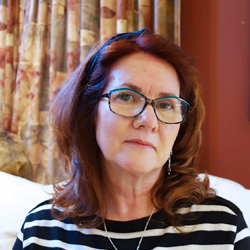
History is richer, truer and more interesting when it includes women.
That’s the understanding Cecilia Morgan developed after receiving the City of Toronto Women and Gender Studies Scholarship in its inaugural year.
“With the support of this award, I learned our understanding of the past was incomplete if we did not take into account women’s histories,” explains Morgan, now professor of the history of education in the Department of Curriculum, Teaching and Learning at OISE at U of T. “We need to see those histories as being shaped by gender but also by class, race and ethnicity, religion and sexuality. The award helped push me to see just how much richer and more interesting our histories are when viewed through a feminist lens.”
As a member of Innis College, Morgan received the scholarship while earning her bachelor of arts in history and women’s studies in 1987. That degree was just the start; she earned two more from the U of T, including a master’s degree in history in 1988 and her PhD in history in 1993.
Since then, she has written several award-winning and well-respected books that examine the history of gender in Canada, Canadian popular culture, commemoration and memory in Canada, and gender and colonialism in the British Empire. Several were short-listed for the Canadian Historical Society’s Sir John A. Macdonald Prize — with one earning honourable mention — and Heroines and History: Representations of Madeleine de Verchères and Laura Secord was awarded the Prix Lionel Groulx – Yves Saint Germain from the Institut d’histoire l’amerique française.
Morgan was recently among 10 U of T faculty to receive a Faculty Research Fellowship at the University’s Jackman Humanities Institute for 2019/20. Fellows are chosen for their research excellence and the promise of their proposed research program. With this award, Morgan is studying letters and documents from influential upper middle-class families to shed new light on the creation of settler society in Upper Canada and nineteenth-century Ontario.
Throughout her career — which has also included a number of public talks, media interviews, blogposts, among other contributions — she has remained committed to highlighting the importance of women’s history in Canada. She has curated exhibits and led research into women in history for the Niagara Historical Society’s Museum, Archives of the Law Society of Upper Canada and others.
“My research and teaching are grounded in the feminist scholarship on women’s history I learned as an undergraduate at U of T, an education that was supported and enriched by this scholarship,” she says. “It helped set me on the path to a career as a historian whose publications have explored gender relations in a number of aspects of Canada’s history and has taught and supervised students in Canadian gender history.”
Looking back, she says the scholarship came not just with much-needed support at a crucial time in her life, but also validation that her interest in feminist work was important and worth pursuing. Ultimately, the impact has been a greater understanding of the role women have had in history, not just in herself but also in the students she’s supervised throughout the years.
“It provided even greater motivation for me to pursue my interests in women’s history and feminist research, as it told me these areas were legitimate areas of scholarly study that also had great relevance outside the academy,” she says.
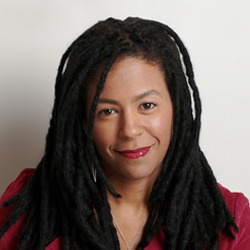
For 25 years, Dawn Wilkinson has been challenging outdated perceptions of what a film director looks like and how stories are brought to life on the screen, thanks in part to the City of Toronto Women and Gender Studies Scholarship she received in 1995.
“I went into a field where there were hardly any women at the time. One of the biggest obstacles I faced early in my career is that I just didn’t look like a director — that’s gender and that’s race,” says Wilkinson, who earned her honours bachelor of arts degree in women and gender, and African studies as a member of U of T’s Innis College in 1996. “The scholarship gave me the confidence to believe I had a right to use my voice and that hard work would result in success.”
The scholarship was awarded after Wilkinson hosted a public school quilting workshop to help mark International Women’s Day in 1995 and was one of several events that helped steer Wilkinson toward the director’s chair. The award inspired her to get more involved in her community and enabled her to take film and video workshops at local Toronto arts organizations. Her growing interest in representing women through storytelling and visual imagery was further nurtured through a U of T cinema class in women and representation taught by Kay Armatage. A programmer with the Toronto International Film Festival (TIFF) at the time, Armatage helped Wilkinson land a role as a theatre rep with TIFF.
She combined some of her scholarship support with funding from U of T’s Hart House Film Board to complete her first film, Dandelion. Just five minutes long, the film features Wilkinson cartwheeling and twirling on a beach as she explores her Black Canadian identity.
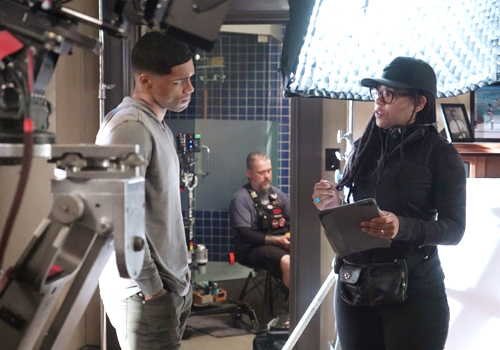
“Thanks to the combination of looking at filmmaking through the lens of women’s representation and at the same time hearing directors present their films at TIFF, a light bulb went off and I thought: ‘I would like to try this,’ ” she says. “I already knew seeing women represented as role models was important to me.”
Today, her directing is mostly for television, with credits including episodes of Kim’s Convenience, The Good Doctor, Riverdale and many more. Being told she’s a particular show’s first female or black director — or both — is the norm, but it’s a responsibility she doesn’t take lightly.
“It’s not like it’s something I can forget about because it’s always just part of the conversation. I always gravitate to stories with strong female characters and perspectives that show female characters in all their dimensions. When I stage a scene or set up a shot, often what I’m thinking is how to privilege the perspective of the female character — not that I’m only showing women characters, of course,” she says.
She points to her direction of episode 8 of Netflix’s Locke and Key, in which character Nina Locke’s grief is explored, as a recent success in her career.
“There are times – and I see it both in television and film — where I want to know more about what a female character is going through but the reaction is not there or the lines are being said but we’re looking at something else,” she says. “I just try to get to the truth of the scene but I make sure the perspective of the character I’m with is the right one. I think about this with race representation as well, and I learned that in women studies. I learned it more in a literary way, but I apply it to the way I visualize scenes.”
So, after 25 years, how should a director look? Behave? Tell stories?
“I’m literally just trying to be myself. It doesn’t work to be a director and try to be someone else,” she says. “The whole essence of what you’re doing is being able to access a level of creativity so you can’t be putting on an act while you’re doing it.”
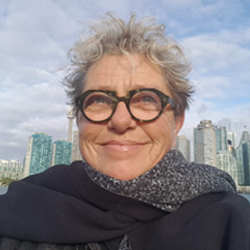
Eva Mackey has come a long way since dropping out of high school in Grade 9 — and she thanks the City of Toronto Women and Gender Studies Scholarship for a large part of that success.
After arriving at U of T as a mature student, Mackey earned her honours bachelor of arts degree in anthropology, women’s studies and Spanish in 1990 as a member of New College. She was awarded the scholarship in her final year, which helped her further develop her passion to study gender, intersectionality, and global and local politics. For the past 30 years, that passion has taken her around the world, helped drive her career in academia and continues to burn brightly today.
“These awards are extremely important because they help people like me gain confidence and take risks to generate their own research on gender issues and politics,” says Mackey, now a professor in the School of Indigenous and Canadian Studies at Carleton University. “In this way, I began to develop the skills to do research and undertake activism to understand and improve the world. The scholarship helped me launch a life’s work exploring the complexities of how to do so.”
Specifically, the scholarship enabled Mackey to explore women’s organizations and gender politics post-liberation in Zimbabwe. That work led to a Commonwealth Scholarship that brought Mackey to England (Sussex) for a master’s degree and PhD in social anthropology on issues that developed from her work in Zimbabwe. Working with feminists from around the world, she began to develop her research, writing and teaching that continues today, first as an assistant professor in the Department of Anthropology at McMaster University and currently at Carleton.
As a postdoctoral fellow at the Centre for Cultural Risk Research at Charles Sturt University in Australia, she examined race relations, specifically the right-wing anti-Indigenous and anti-immigrant sentiment represented by the rise of Pauline Hanson, founder and leader of the right-wing populist One Nation.
“That work developed and expanded my concern with how societies similar to Canada deal with difference, prejudice and inequality — all concerns that emerged from my feminist training and research,” she says. “My focus is on how majority populations maintain and defend their privileges.”
She returned to that side of the world — New Zealand — in 2011 with the support of an International Council for Canadian Studies International Research Linkages Grant. Working with Avril Bell at New Zealand’s Massey University, she organized an international research workshop Living Together Differently: Indigene-Settler-Migrant Relations in Canada and Aotearoa New Zealand. She also gave virtual talks to New Zealand universities as a Distinguished Visiting Scholar at Massey University New Zealand.”
She says the core learnings gained from her scholarship concerning gender, race, colonialism and history continue to inform her work, including her two books, 2016’s Unsettled Expectations: Uncertainty, Land and Settler Decolonization and 2002’s The House of Difference: Cultural Politics and National Identity in Canada. The House of Difference is found in university syllabuses and libraries around the world.
“The scholarship helped me develop fundamental knowledge and skills about the world, about research, and about the importance of doing fieldwork, which means talking to people and really listening to try to understand the often-silenced stories and histories of women and others often ignored in mainstream versions of history and politics.”
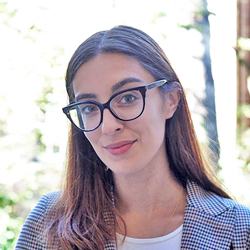
Mara Raposo’s road to success is clearer, thanks to the City of Toronto Women and Gender Studies Scholarship.
“My family raised me to love learning and to treat university as the social mobility ‘golden ticket,’ but, at the threshold of my first year at university, they recognized there were limitations on how much they would be able to support me academically, emotionally and financially to get me through to the other side,’” says Raposo. “Like many first-in-the-family students, receiving this scholarship was like being handed a key that would unlock one of the many barriers on the way.”
A child of Portuguese parents, Raposo is the first in her family to attend university. In fact, higher education had been widely discouraged on the small island off the Portuguese coast in the Azores from which her family immigrated.
“The process of me going to university in Canada has been a learning experience for my entire family, and they’ve tried their best to help me. Winning these awards — I can’t even describe what that was like for us. When my parents were flying here in the 1970s, they never would’ve guessed someone in the family would make it to university, let alone Oxford.”
The scholarship support helped remove the very first barrier she faced after earning her honours bachelor of arts degree in women’s studies as a member of Victoria College in 2018: namely, the expense of continuing her education outside Canada.
“All I wanted at that time was the opportunity to study social policy, because my studies had taught me to think critically about equality and equity and I wanted to learn how to achieve these by using public sector tools. But the best schools for this policy specialism were in the U.K. and the U.S.,” she recalls. “This meant that, wherever I landed, my next endeavour would be expensive and any financial support I received was invaluable.”
She earned her master of science degree in comparative social policy at the University of Oxford in 2019, and now works as a junior consultant at a boutique public sector consultancy firm with schools, charities and all levels of government to improve and open public schools in disadvantaged parts of the U.K.
She’s particularly proud of her work in support of the opening of an alternative high school in London for at-risk youth who have disengaged from mainstream schools for a range of personal and social factors. Violence in their communities and homes is common.
“The approach to this new school is unlike anything I have seen, as it melds academics with vocational opportunities, one-on-one therapeutic support and strong community-level mentoring,” she says. “The goal for the school is, yes, to see that these disadvantaged youth finish high school but, more than that, to give them a safe space and high-quality tools to develop personally and socially.”
Her long-term plans include returning to Toronto with a new skillset to make institutional-level change and contribute to the status of women. That toolkit includes her knowledge of the complex conditions in which social policies and programs can excel or fail, which she learned at U of T, and the critically important skills for professional research she learned at Oxford.
“For this to have come as a joint scholarship from both the Women & Gender Studies Institute and the City of Toronto made it another gift altogether,” she says. “This was the government of my hometown and the department that equipped me with the tools to fight for equality and justice, not only investing in but believing in my plans for the future. I went off to study this important policy field knowing I not only had the support of my family, but both the University and the City of Toronto, too.”
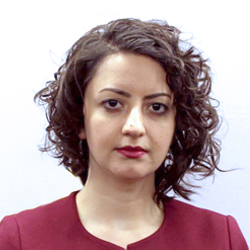
Raha Bahreini’s passion for human rights was born in Iran, nurtured in the Faculty of Arts & Science’s Women & Gender Studies Institute at the University of Toronto and is now helping improve the lives of Iranians still facing oppression, repression and discrimination.
As Amnesty International’s researcher on Iran based in the U.K., Bahreini leads large-scale projects that inform the campaigns and advocacy work of Amnesty International and its activist networks. She researches, evaluates and documents human rights violations, with key concerns being: wrongful imprisonment, torture and the death penalty, restricted freedoms, systematic discrimination against women and minorities, and the Iranian authorities’ lack of accountability.
“I always had a passion for social justice and human rights issues, and it’s a passion that continues to inform my work today,” says Bahreini, who immigrated to Canada with her family from Iran when she was 16. “From a very early age I knew I wanted to become a human rights lawyer and join the struggle toward building a more just and compassionate society.”
Her post-secondary journey to realizing that dream started in U of T’s Faculty of Arts & Science as a member of Victoria College. Before earning her honours bachelor of arts in women and gender studies and ethics, society and law in 2008, she was awarded a City of Toronto Women and Gender Studies Scholarship that boosted her morale and helped her excel academically.
“The scholarship allowed me to focus on my studies and achieve the marks I needed for law school,” she says. “In terms of my morale, it was great to receive a scholarship of this stature, especially in the area of women’s issues, because that was always one of my priorities in terms of both research and activism.”
While earning her law degree at Osgoode Hall Law School at York University, she worked as a legal caseworker with Parkdale Community Legal Services in Toronto, assisting vulnerable asylum seekers and migrants. Upon graduation, she launched a career in social justice and human rights issues in Canada, first as a public interest law fellow with Amnesty International Canada and then as a senior researcher with a human rights unit at the University of Essex, U.K, where she assisted the work of the UN Special Rapporteur on the situation of human rights in Iran. She also continued her postgraduate studies, earning a masters in international human rights law from the University of Essex, U.K.
Now with Amnesty International, Bahreini works with a trusted network of activists and lawyers inside Iran and in diaspora to develop detailed reports of human rights violations.
True to her U of T studies, her work acknowledges the impact human rights violations have on women and persons with diverse sexual orientations and gender identities. Her projects have addressed issues of discrimination and violence based on sexual orientation and gender identity; violations of sexual and reproductive rights; and homophobia and transphobia around gender reassignment surgery processes in Iran.
“I always seek to apply a gender lens to any projects we do, even if on the surface it doesn’t seem to relate specifically to women or persons of diverse sexual orientations and gender identities. It’s always important to assess the disproportionate impact that abusive policies and practices may have on women and other communities facing long-standing patterns of discrimination and inequality,” she says, adding that recent projects have included campaigning and advocacy against discriminatory and degrading laws forcing women in Iran to wear the veil and researching the cases of women’s rights defenders who have been unjustly imprisoned for peacefully protesting against forced veiling.
While she believes everyone has the power to show empathy and compassion for victims of human rights violations, her own childhood played a role in heightening her desire to help people live freer lives.
“I grew up in the 1980s, one of the most heinous chapters of state violence in Iran’s modern history. Thousands of political dissidents were summarily executed and thousands more were arbitrarily imprisoned and systematically tortured. I vividly remember the rage I felt so often because public officials were denying us freedom of belief and cruelly forcing us to follow codes of conduct rooted in the most strict interpretation of Shi’a Islam,” she says. “When you are exposed to extreme forms of oppression, repression and discrimination, the urge to make changes can become more intense.
“In my case seeing the oppression and suffering inflicted on my family, friends, neighbours and fellow human beings, and also as a girl growing up in a country with discriminatory and degrading laws and practices against girls and women, I always wanted to resist oppressive systems. The experience of immigration to Canada broadened my perspective beyond Iran. Systems of oppression operate at varying levels in every society and context. But fortunately, so do the collective struggles of people for justice and equality.”

